|
Books Should Be Free Loyal Books Free Public Domain Audiobooks & eBook Downloads |
|
|
Books Should Be Free Loyal Books Free Public Domain Audiobooks & eBook Downloads |
|
Adventure Books |
|---|
|
Book type:
Sort by:
View by:
|
By: Upton Sinclair (1878-1968) | |
|---|---|
 A Prisoner of Morro
A Prisoner of Morro
Upton Sinclair, born in 1878 was a Pulitzer Prize-winning American author. He wrote over 90 books in many genres. Best known for his muckraking novel, The Jungle, Sinclair also wrote adventure fiction. Many of these works were written under the pseudonym, Ensign Clark Fitch, U.S.N. A Prisoner of Morrow, published in 1898 when Sinclair was but 20 years old, is one of these efforts. The period for this work is the ten-week Spanish–American War which occurred in 1898. Revolts against Spanish rule had been prevalent for decades in Cuba and were closely watched by Americans... | |
By: Emma Orczy (1865-1947) | |
|---|---|
 The League of the Scarlet Pimpernel
The League of the Scarlet Pimpernel
Written by Baroness Orczy and first published in 1919, The League of the Scarlet Pimpernel is a sequel book to the classic adventure tale, The Scarlet Pimpernel. The book consists of eleven short stories about Sir Percy Blakeney’s exploits in rescuing various aristos and French citizens from the clutches of the guillotine. The stories which are listed below, are set in 1793 but appear in no particular order. They occasionally refer to events in other books in the series. | |
By: Publius Vergilius Maro (70 BC - 19 AD) | |
|---|---|
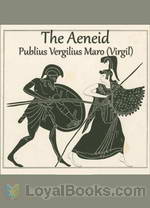 The Aeneid
The Aeneid
The Aeneid is a Latin epic written by Virgil in the 1st century BC that tells the legendary story of Aeneas, a Trojan who traveled to Italy, where he became the ancestor of the Romans. The first six of the poem’s twelve books tell the story of Aeneas’ wanderings from Troy to Italy, and the poem’s second half treats the Trojans’ ultimately victorious war upon the Latins, under whose name Aeneas and his Trojan followers are destined to be subsumed. The poem was commissioned from Vergil by the Emperor Augustus to glorify Rome... | |
By: George Alfred Henty | |
|---|---|
 The Cat of Bubastes
The Cat of Bubastes
G.A. Henty’s “tale of ancient Egypt” tells the story of Amuba, prince of the Rebu, who is taken captive when his people are conquered by the Egyptians, and then becomes the servant and companion of Chebron, son of the high priest of Osiris. A mystery unfolds as the lads find evidence of a murderous conspiracy within the ranks of the priesthood; but they must then flee for their lives when they unintentionally kill the cat selected as the successor to the Cat of Bubastes, one of the most sacred animals of Egypt. Amuba and Chebron are strong, courageous, and resourceful – but will this be enough to carry them beyond the long reach of the power of Egypt? | |
 True to the Old Flag
True to the Old Flag
This book tells the story of the American war of Independence from the side of the British. The old flag mentioned in the title is the flag of England. This is a book for young readers, but - as a good book should be - everybody can enjoy it". | |
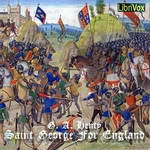 St George for England
St George for England
A tale set in England in the time of Cressy and Pointiers. A child of noble birth whose parents have fallen foul of the current royalty is taken by his dying mother and placed in hiding. He grows up with a bowyer and then apprenticed to an armourer just outside the gates of the City of London, becomes accomplished in arms and joins the campaign in France.A tale of heroism and 14th century viciousness. Great fun. | |
 On the Irrawaddy, A Story of the First Burmese War(1897)
On the Irrawaddy, A Story of the First Burmese War(1897)
With the exception of the terrible retreat from Afghanistan, none of England's many little wars have been so fatal--in proportion to the number of those engaged--as our first expedition to Burma. It was undertaken without any due comprehension of the difficulties to be encountered, from the effects of climate and the deficiency of transport; the power, and still more the obstinacy and arrogance of the court of Ava were altogether underrated; and it was considered that our possession of her ports would assuredly bring the enemy, who had wantonly forced the struggle upon us, to submission... | |
 In Freedom's Cause
In Freedom's Cause
Another stirring tale from the master of historical fiction set in the time of Robert Bruce and William Wallace and their struggle for Scotland's independence. | |
By: Andy Adams | |
|---|---|
 The Log of a Cowboy
The Log of a Cowboy
The Log of a Cowboy is an account of a five-month drive of 3,000 cattle from Brownsville, Texas, to Montana in 1882 along the Great Western Cattle Trail. Although the book is fiction, it is firmly based on Adams's own experiences on the trail, and it is considered by many to be the best account of cowboy life in literature. Adams was disgusted by the unrealistic cowboy fiction being published in his day; The Log of a Cowboy was his response. It is still in print, and even modern reviewers consider it a compelling classic... | |
 Reed Anthony, Cowman: An Autobiography
Reed Anthony, Cowman: An Autobiography
Adams breathes life into the story of a Texas cowboy who becomes a wealthy and influential cattleman.. (Introduction by Wikipedia) | |
By: Mrs. L. T. Meade (1854-1914) | |
|---|---|
 The Rebel of the School
The Rebel of the School
Kathleen O’Hara is a young pretty girl sent to school in England from Ireland by her father to get a good education, but Kathleen has other ideas. She quickly become friends with the girls of the school who don’t pay for their education and in turn these girls consider Kathleen to be their Queen. What trouble will Kathleen and her friends get into? And what will the school do with the naughty, “Rebel of the School?” | |
By: Algernon Blackwood (1869-1951) | |
|---|---|
 The Camp of the Dog
The Camp of the Dog
A party of campers on a deserted Baltic island is terrorized by a huge wolf… or is it? | |
By: George Manville Fenn (1831-1909) | |
|---|---|
 Bunyip Land
Bunyip Land
Joe Carstairs is a boy on a farm in Australia. His father is a keen naturalist who, some years before had set off for New Guinea in search of specimens, and never been heard of again. Joe is old enough to mount a search expedition, and takes with him a local doctor and an aboriginal worker on his farm. They find themselves joined by a stowaway, Jimmy, whose father is a squatter (farmer) nearby, together with his dog, Gyp.This team sets off, arrive in New Guinea, hire some more porters, and travel guided by some sixth sense straight to where Mr... | |
 Peril Finders
Peril Finders
In California settlers are trying to make a living working as fruit-growers. Problems with blights and insects mean that the crops are failing. A prospector arrives and tells stories of ancient cities where there is a lot of gold. He then dies. Some of the settlers decide to go and search for the gold. They have long distances to travel and meet many challenges along the way. They eventually reach one of these cities and find evidence that it has been abandoned by invaders hundreds or thousands of years ago... | |
 Cutlass and Cudgel
Cutlass and Cudgel
Based around the crew of cutter HMS White Hawk, this is a tale of smuggling in the early 19th century off the coast of Wessex. The midshipman of the cutter is taken hostage by the smugglers and is befriended by a farm-boy, son of one of the smugglers. His friendship is rudely rebuffed, the midshipman eventually escapes and the farm-boy gets his long-held dream of becoming a seaman on an Excise vessel. | |
By: H. G. Wells | |
|---|---|
 In the Days of the Comet
In the Days of the Comet
William ("Willie") is a student living in the British town of Clayton. As a Socialist, he tries to move power from the upper class to the working class. Interestingly, in a fictitious confrontation Britain declares war on Germany. Willie falls in love with Nettie, but when she elopes with an upper-class man, Willie resolves to kill them both. Throughout the novel there is present in the sky a large comet which gives off a green glow. As Willie prepares to shoot the lovers, two battleships appear and begin shelling the coast, causing Willie to nearly lose his targets... | |
By: Sax Rohmer (1883-1959) | |
|---|---|
 The Insidious Dr. Fu-Manchu
The Insidious Dr. Fu-Manchu
The first of the Fu-Manchu novels this story follows the two characters who are set against the machinations of the insidious doctor. | |
 The Quest of the Sacred Slipper
The Quest of the Sacred Slipper
Cavanagh becomes involved in the adventurous search for a precious relic in the mysterious East. (Introduction by Laineyben) | |
By: Theodore Roosevelt | |
|---|---|
 Through the Brazilian Wilderness
Through the Brazilian Wilderness
Roosevelt’s popular book Through the Brazilian Wilderness describes his expedition into the Brazilian jungle in 1913 as a member of the Roosevelt-Rondon Scientific Expedition co-named after its leader, Brazilian explorer Cândido Rondon. The book describes all of the scientific discovery, scenic tropical vistas and exotic flora, fauna and wild life experienced on the expedition. One goal of the expedition was to find the headwaters of the Rio da Duvida, the River of Doubt, and trace it north to the Madeira and thence to the Amazon River... | |
By: Frank Pinkerton | |
|---|---|
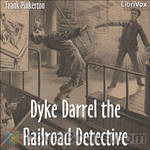 Dyke Darrel the Railroad Detective
Dyke Darrel the Railroad Detective
Dyke Darrel investigates an audacious train robbery that included the murder of a friend, and embarks on a man-hunt. High Victorian serial melodrama at its best! | |
By: Frederick Marryat (1792-1848) | |
|---|---|
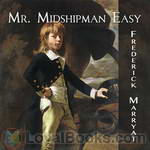 Mr. Midshipman Easy
Mr. Midshipman Easy
One of the first novel-length pieces of nautical fiction, MR. MIDSHIPMAN EASY (1836) is a funny and easygoing account of the adventures of Jack Easy, a son of privilege who joins the Royal Navy. The work begins as a satire on Jack’s attachment to “the rights of man” that may try the listener’s patience. But despair not, for the story soon settles down as the philosophical midshipman begins his many triumphs over bullies, foul weather, and various damned foreigners of murderous intent.Caveat audiens: This novel employs racial/ethnic epithets and religious stereotypes, as well as taking a rather sunny view of supply-side economics... | |
 Snarleyyow
Snarleyyow
This is a quite amusing nautical tale of the British Navy of the around the year 1700. While, as with much early 'humor', it is somewhat heavy-handed, the sympathies of the author are clear and good, and cruelty is often averted by good fortune or background characters. First published under the title 'The Dog Fiend', the primary characters are an evil captain of a cutter and his dog. The dog seems indestructible, as is the poor cabin boy who is the butt of the captain's ill humor, and who often is chewed on by the dog... | |
By: Plague Ship (1912-2005) | |
|---|---|
 Voodoo Planet
Voodoo Planet
The sequel to Plague Ship, Voodoo Planet finds the Solar Queen banned from trade and starting her supposed quiet two-year stint as an interstellar mail carrier. But instead her crew accepts a visit to the safari planet of Khatka, where they find themselves caught in a battle between the forces of reason and the powers of Khatka’s mind-controlling wizard. | |
By: Nat Love (1854-1921) | |
|---|---|
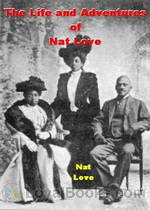 The Life and Adventures of Nat Love, Also Known As Deadwood Dick
The Life and Adventures of Nat Love, Also Known As Deadwood Dick
Nat Love was born a slave, emancipated into abject poverty, grew up riding the range as a cowboy and spent his maturity riding the rails as a Pullman Porter. For me, the most amazing thing about him is that despite the circumstances of his life, which included being owned like a farm animal solely because of the color of his skin and spending later decades living and working as an equal with white coworkers, he was an unrepentant racist! Convinced that the only good Indian was a dead one, and that... | |
By: Henry Fielding (1707-1754) | |
|---|---|
 Journal of a Voyage to Lisbon
Journal of a Voyage to Lisbon
Sailing voyage from England to Portugal in the mid Eighteenth Century, by one of the premier humorists, satirists, novelists and playwrights of his age. It was to be his last work, as his failing health proved unable to persevere much longer after the voyage. | |
By: William Morris (1834-1896) | |
|---|---|
 Völsungasaga
Völsungasaga
The 13th century Icelandic Völsungasaga is usually read by people studying the Poetic Edda or Wagner’s Ring – which obscures the fact it is a much better story than practically everything derived from it. A riddle-telling dragon, a broken sword, a hooded mysterious wanderer – cannibalism, incest, mutilation, and sensitive hearts. This is R-rated Tolkien – and the unashamedly archaic Magnússon-Morris translation is up for the adventure.Passages spoken in Old Norse are taken from the edition of Sophus Bugge, Berlin, 1891. | |
 The Well at the World's End, Book 1: The Road unto Love
The Well at the World's End, Book 1: The Road unto Love
The Well at World's End is thought to be one of the first examples of an entirely fictional fantasy world, and has greatly influenced later fantasy writers such as C.S. Lewis and J.R.R. Tolkien. The book follows the travels of Ralph, a prince of a tiny country, as he disobeys his fathers wishes and runs away from home to adventure in the world, and seek out the fabled Well at World's End, said to grant eternal youth to those who drink from it. | |
By: Grace Livingston Hill (1865-1947) | |
|---|---|
 The Best Man
The Best Man
Cyril Gordon, a young and handsome secret service agent is running from pursuers who desperately want the information he holds. He hides out from them in a church, and then finds himself married to a woman he’s never seen before. A sweet and sometimes, funny, romance, with several exciting chases. | |
By: Ernest William Hornung (1866-1921) | |
|---|---|
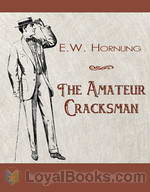 The Amateur Cracksman
The Amateur Cracksman
“I’d tasted blood, and it was all over with me. Why should I work when I could steal? Why settle down to some humdrum uncongenial billet, when excitement, romance, danger and a decent living were all going begging together” – A. J. Raffles, The Ides of March. | |
By: William Clark Russell (1844-1911) | |
|---|---|
 The Frozen Pirate
The Frozen Pirate
Sailing adventure with storms, icebergs, shipwrecks, treasure, and the reawakening of a pirate frozen in suspended animation for nearly fifty years | |
By: Mary Godolphin (1781-1864) | |
|---|---|
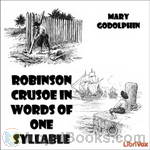 Robinson Crusoe in Words of One Syllable
Robinson Crusoe in Words of One Syllable
Mary Godolphin was the pseudonym of Lucy Aikin who undertook translating great literature into single-syllable words so that young readers could enjoy plots that were considerably more interesting than, say, the McGuffey readers of the 1880’s or the “Dick and Jane” primers of the 1950s (still around today as “decodable readers” in elementary schools). She produced this volume based on Daniel Defoe’s most famous work, considered by many to be the first English novel (1719). She also rendered Bunyan’s Pilgrim’s Progress and Wyss’ Swiss Family Robinson, which she translated as well. | |
By: L. Frank Baum (1856-1919) | |
|---|---|
 Aunt Jane's Nieces at Work
Aunt Jane's Nieces at Work
The novel carries forward the continuing story of the three cousins Louise Merrick, Beth De Graf, and Patsy Doyle, and their circle. The title is somewhat misleading; it could more accurately have been called Aunt Jane's Nieces in Politics. (Uncle John Merrick tells his nieces that politics is "work," which yields the title.)The story begins three days after the end of the previous book, Aunt Jane's Nieces at Millville; the freckled and red-haired Patsy still sports a sunburn from her summer in the Adirondacks... | |